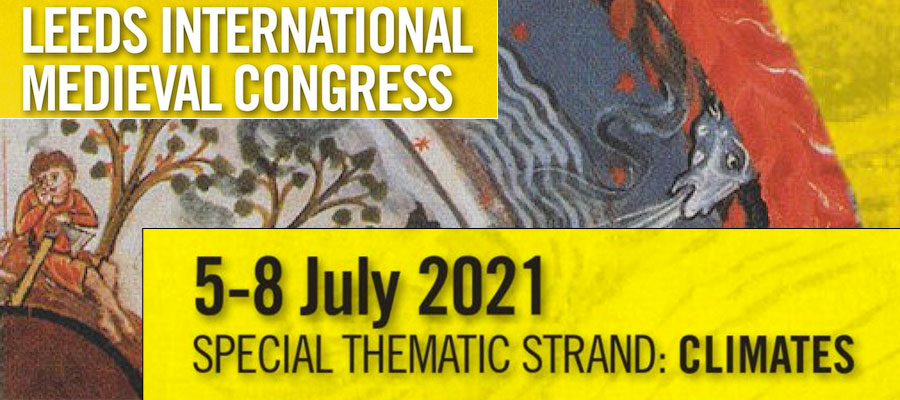28th International Medieval Congress, University of Leeds, July 5–8, 2021
The International Medieval Congress provides an interdisciplinary forum for the discussion of all aspects of Medieval Studies. Proposals on any topic related to the Middle Ages are welcome, while every year the IMC also chooses a special thematic focus. In 2021 this is ‘Climates’.
Climates are engendered by powerful interactions of heavens, oceans, and earth, and are themselves potent forces in complicated relationships with water, landscapes, patterns of weather, and human and non-human life. They affect, and are affected by, other climates – including of thought, opinion, feeling, belief, politics, society, and economics. Medievalists study populations across the globe that understood this interconnectedness in multiple ways, invested causal and explanatory power in observable phenomena, and lived in communities that were both vulnerable and responsive to shifting environmental conditions. Climates – in the many senses of the word – are now among the most pressing issues of our times. Expertise on the medieval period is becoming increasingly important to scientific and public conversations, while intensifying global instability threatens both the future study of a period long synonymous with irrelevancy, and the preservation of its material remains.
‘Climates’ can be explored on many levels, from the planetary to the intimately local, offering alternative routes to explore ideas of centres and peripheries, agency and determinism, connectivities, interdependencies and comparisons, as well as what constitutes the ‘global’ in this period. It was within dynamic environments and ecosystems that humans lived, moved, organised themselves, developed cosmologies, philosophies, and theologies, created material objects, literatures, and other records, extracted and exchanged the resources of different regions, competed for land and power, and faced disaster, displacement, and violence.
Themes to be addressed may include, but are not limited to:
- Medieval concepts of ‘climes’ and ‘climate’
- Cosmologies, world views, natural or supernatural causation
- Medieval enquiry into weather, seasons, monsoon patterns
- Astronomical and astrological observations and predictions
- Agriculture, pastoralism, modification of landscapes, exploitation of resources, inequality, colonialism
- Environmental determinism, medieval histories of modern inequalities
- Societal organisation, hierarchy, law-making, governance
- Applying paradigms of adaption, resilience, and collapse
- Ecosystems, entanglements, human and non-human agency
- ‘Climates’ of opinion, thought, feeling
- Disease, pathogens, and microbes
- Relationships between climate change and human history
- Ecocriticism, critical race theory, indigenous knowledge, ecofeminism, queer ecology
- Weather and weathering
- Interdisciplinarity and integration of historical climate and environmental data
- ‘Provincialising Europe’: Writing history on the ‘planetary’ or biospheric scale
- ’Climates’ and interregional connectivities, interdependencies and disconnections
- Fluctuations in migration, mobility, trade, exchange, and transmission
- Seas, oceans, rivers, monsoon, floods as dynamic spaces
- Medievalists, politics, climate justice, pedagogy, and activism
- Preservation of material remains amid growing climate and societal instability
The Special Thematic Strand ‘Climates‘ will be co-ordinated by Amanda Power (Faculty of History / St Catherine’s College, University of Oxford).
The IMC welcomes session and paper proposals submitted in all major languages.
Paper proposal deadline: 31 August 2020.
Session proposal deadline: 30 September 2020.
